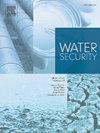中低收入国家售水的性别维度:范围审查
IF 4.3
Q1 Earth and Planetary Sciences
引用次数: 0
摘要
这个范围审查汇集了现有的文献在性别层面的水贩卖。虽然关于这一主题的研究仍然有限,但现有的研究表明,性别对自动售水的动态及其对性别平等的影响显著。通过卖水来表达性别是特定情境的,受文化、社会、经济和环境因素的影响,并随着时间的推移而演变。研究结果表明,性别规范、角色和关系在塑造当地的自动售水系统中起着至关重要的作用。影响自动售水与性别之间关系的关键因素包括不同类型的劳动力——特别是生产和生殖工作的交集——以及自动售水发生的更广泛的经济、社会和环境条件。这些调查结果突出表明,必须认识到供水系统的性别性质,以确保公平取水和促进性别平等。这一审查强调,尽管地方卖水做法各不相同,但这些活动的性别性质仍然是影响更广泛的不平等问题的关键因素。本文章由计算机程序翻译,如有差异,请以英文原文为准。
Gender dimensions of water vending in LMICs: A scoping review
This scoping review draws together the existing literature on the gender dimensions of water vending. Although research on this topic remains limited, available studies indicate that gender significantly influences the dynamics of water vending and its implications for gender equality. The expression of gender through water vending is context-specific, shaped by cultural, social, economic, and environmental factors, and it evolves over time. The findings show that gender norms, roles, and relations play a crucial role in shaping local water vending systems. Key factors that affect the relationship between water vending and gender include different types of labor—particularly the intersection of productive and reproductive work—and the broader economic, social, and environmental conditions in which water vending occurs. These findings highlight the need to recognize the gendered nature of water supply systems in order to ensure equitable water access and promote gender equality. This review emphasizes that, despite the heterogeneity of local water vending practices, the gendered nature of these activities remains a critical factor influencing broader issues of inequality.
求助全文
通过发布文献求助,成功后即可免费获取论文全文。
去求助
来源期刊

Water Security
Earth and Planetary Sciences-Oceanography
CiteScore
8.50
自引率
0.00%
发文量
17
期刊介绍:
Water Security aims to publish papers that contribute to a better understanding of the economic, social, biophysical, technological, and institutional influencers of current and future global water security. At the same time the journal intends to stimulate debate, backed by science, with strong interdisciplinary connections. The goal is to publish concise and timely reviews and synthesis articles about research covering the following elements of water security: -Shortage- Flooding- Governance- Health and Sanitation
 求助内容:
求助内容: 应助结果提醒方式:
应助结果提醒方式:


